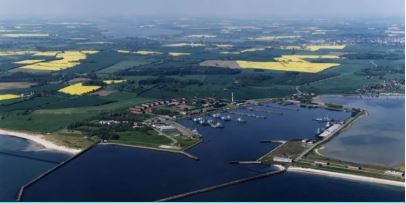The new maritime coordinator sees outstanding economic opportunities for Germany on the way to achieving climate neutrality. Common regulations for arms exports are to be developed at European level.
On 5 January 2022, Claudia Müller (Greens) was appointed Federal Government Coordinator for Maritime Economy and Tourism. Her predecessor in office, Norbert Brackmann (CDU), had held this position since April 2018. She announced her programme priorities as soon as she was appointed: "We must focus on climate-neutral propulsion systems in Germany and, if possible, in Europe as well, and thus make Europe more sustainable as a shipyard location." Shipping is at a decisive turning point where the technology of the coming decade will be decided. There is a binding target to reduce greenhouse gas emissions by half by 2050. To achieve this, not only would new ships have to be built, but the existing fleet would also have to be equipped in a more climate-friendly way in future. "The federal government must and can lead the way here, as it is a major shipowner with customs, the federal police and the fisheries inspectorate. We can show that it is possible to make shipping climate-neutral." Some of the necessary technologies are already available. Offshore technology is also part of the maritime industry. Environmental and nature aspects play a major role in the construction of offshore wind farms. Müller also announced that the topic of munitions clearance in the Baltic and North Sea would be dealt with intensively, as enormous safety and environmental risks are hidden there.
The office you hold is called Coordinator for Maritime Economy and Tourism. What is the reason for the expansion of your responsibilities to include tourism? Is this now the focus of your work?
As Federal Government Coordinator, I am also responsible for tourism, because they were simply looking to see who had the most expertise in this area at political management level. As I worked in tourism before my political career, I was the obvious choice. However, it is very important to me to give equal weighting to tourism and the maritime sector. As the maritime sector is already somewhat more experienced in dealing with a coordinator due to the last legislative term, it is important to find and maintain the right balance between the two areas.
With the Maritime Agenda 2025 and 2030, your predecessor took up and initiated many of your programme points, such as climate-neutral shipping, strengthening Germany as a maritime location and developing innovative and environmentally friendly maritime technologies and drives. Are you continuing your Maritime Agenda or are you setting new maritime priorities?
In the coalition agreement for this legislative period, it was agreed that we would be guided by the goals of the Maritime Agenda. The issue of climate neutrality in shipping is of course of paramount importance. We need to make significant progress here as quickly as possible.
The development of climate-neutral propulsion systems made in Germany harbours huge opportunities. These opportunities will help to secure and strengthen Germany as a shipbuilding location and we will set the right course for this.
The shipbuilding industry is currently in a deep crisis, with some shipyards having to file for insolvency. What measures do you intend to take to support this industry?
Modern shipbuilding has a future in Germany. The increasing global ambitions in climate protection and, in this context, the upcoming modernisation of the global fleets on the way to climate neutrality offer a particular opportunity. The expansion of offshore wind farms is also creating additional market opportunities for German shipyards. It is now important to focus on new products and technologies. For example, when it comes to propulsion systems. The German government will support companies in this, for example with our maritime funding programmes. At the same time, we are currently examining how we can stabilise the shipbuilding industry through public contracts in both the civil and military sectors.
Do the German procurement law conditions and arms export regulations for naval vessels require standardised regulation in the EU?
German public procurement law in the area of defence and security is largely and essentially based on European requirements, which we have transposed into national law. However, EU member states have the option of making exceptions if this is necessary to safeguard essential security interests. Germany has implemented the exceptions to European public procurement law in the Act against Restraints of Competition and added key technologies from the defence sector as a statutory rule for essential security interests in 2020. In the German government's strategy paper on strengthening the security and defence industry, naval shipbuilding of surface and underwater platforms was defined as a national defence industry key technology. This definition is within the framework of the European law described above.
As far as arms exports are concerned, the coalition agreement stipulates that we will work at European level to strengthen common rules and, in particular, in favour of an arms export regulation. In addition, the Federal Government will draw up a national arms export control law. The aim is to enshrine the existing regulations in a law and to expand the monitoring of the final destination of exported military equipment, the so-called post-shipment controls. The law is being drafted under the leadership of the Federal Ministry for Economic Affairs and Climate Protection. It is the first time in German history that the Federal Government's cautious and responsible arms export controls are to be expressly enshrined in law.
Munitions clearance in the Baltic and North Sea is part of your programme list. How exactly do you intend to proceed in order to realise this important project quickly?
We are working flat out to find a solution. In the coalition agreement, we already resolved to set up an immediate programme for the salvage and destruction of old munitions in the North Sea and Baltic Sea and to establish a federal-state fund for medium and long-term salvage. We are now implementing this plan. The Federal Ministry for the Environment, Nature Conservation, Nuclear Safety and Consumer Protection (BMUV) has taken the lead for the immediate action programme. The budget funds raised by the BMUV will be used for a period of five years for the procedural steps to be initiated, after which there will be a transition to permanent operation. The immediate action programme will initially focus on the selection of suitable areas, construction measures, technical equipment and pilot projects.
What strategies for strengthening the maritime industry in Germany are you basically guided by?
I am convinced that our maritime industry will continue to be successful in global competition. With the innovative and high-quality products made in Germany in the areas of shipbuilding, marine technology and the offshore wind industry, we are world-class today and will continue to hold our own in international competition. However, we must not rest on our laurels. As the German government, we therefore support maritime companies in investing in research, development and innovation.
Through our support and the innovative strength of our companies, we transform political goals, such as combating climate change, into tangible business opportunities.
The 13th National Maritime Conference is scheduled to take place in 2023. What maritime topics do you want to bring up there? Will Federal Chancellor Scholz take over the patronage, as Chancellor Merkel has done before?
Planning for the next National Maritime Conference is already in full swing. We will approach the Federal Chancellor in due course and ask him to take over the patronage. Of course, I very much hope that he will agree. But as a Hanseatic citizen, he has a "maritime gene", so to speak. I am therefore confident as far as the question of patronage is concerned.
Dieter Stockfisch















On closer reading, another unmentioned topic comes to mind: what about maritime security? Naval shipbuilding only makes sense if you know what you need these ships for, right?